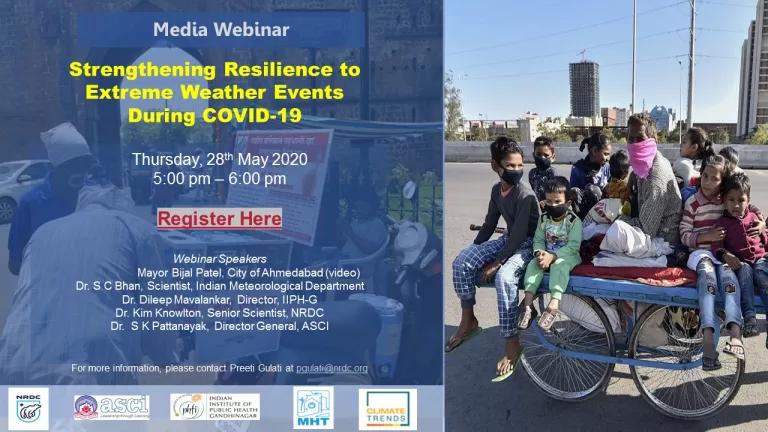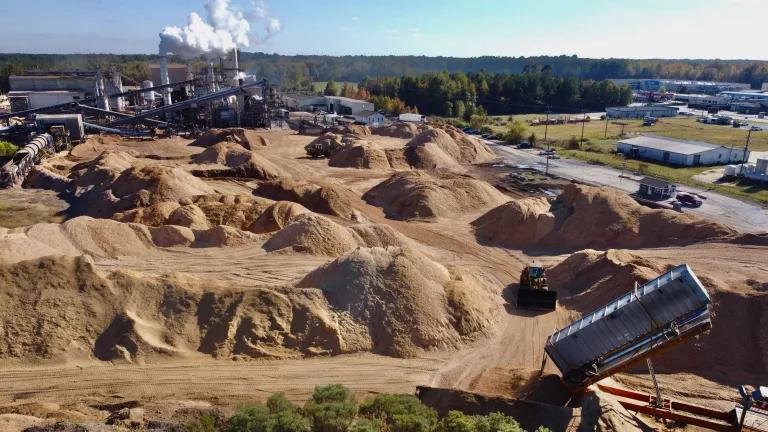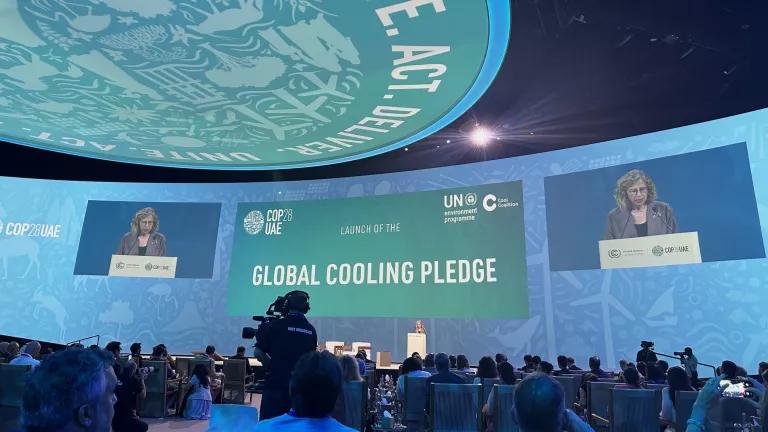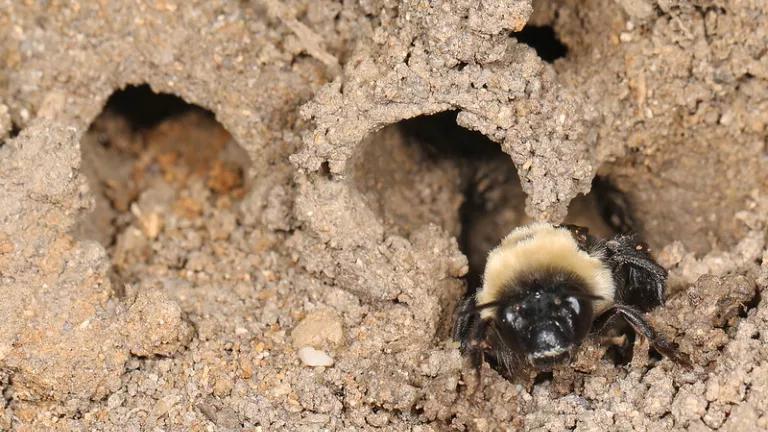Heatwaves, Cyclones, and Extreme Weather During COVID-19

Learn more about NRDC’s response to COVID-19.
Extreme heat, cyclones, locust swarms are all devastating India, while communities are already suffering from COVID-19. Northern and central India are reeling from heatwaves this month. Communities are also recovering from the devastation from Cyclone Amphan. Locust swarms are also inundating regions across India this week. All this in the midst of a global pandemic and economic downturn.
On top of all this, the climate crisis is fueling higher temperatures and more extreme weather. Government officials and health experts are diligently working to respond to these emergencies in parallel. To put the challenges and response into context, a set of experts are coming together for a webinar on “Strengthening Resilience to Extreme Weather Events During COVID-19” on Thursday, 28th May 2020 from 5-6 pm IST.
Extreme Heat Threatens Health
Extreme heat is a major health threat in India and many other parts of the world. Extreme heat is not merely an inconvenience; it can kill. Symptoms of heat-related illness include vomiting, headaches, dehydration, and diarrhea. Staff in hospitals, businesses, and municipal buildings often struggle to keep people cool and healthy.
Climate change is fueling more frequent, intense, and longer heat waves. Heat-related health risks continue to grow and this year large numbers of Indian states are experiencing dangerous heatwaves at the same time.
As temperatures climb to brutal levels this year -- to over 47ºC (116 ºF)—the India Meteorological Department (IMD) issued a “red alert” heatwave warning urging residents to stay home this week. New Delhi and 10 states—Andhra Pradesh, Chhattisgarh, Gujarat, Haryana, Jharkhand, Maharashtra, Odisha, Punjab, Rajasthan and Uttar Pradesh—are experiencing heatwave conditions according to IMD.
This year the challenge is more acute, as 1.3 billion people across the country shelter in place during the COVID-19 pandemic. Homes for a large percentage of people living in slums and low-income communities are far from optimal with few options for cooling and highly compromised living conditions. For such households social distancing is also virtually impossible.
Fortunately, earlier in the month IMD and the National Disaster Management Authority (NDMA) started to work to prepare for heatwaves and activated the network of state disaster response agencies, city leaders and partners. NDMA prepared an updated list of Do’s and Don’ts for heatwaves. In addition, through NDMA’s leadership states are ramping up activities under Heat Action Plans. Personal strategies such as staying out of the sun, drinking plenty of water, staying cool and seeking medical assistance when feeling unwell are effective in combating heat-related illness.
Cyclone Amphan and Locust Swarms
Eastern India in the Bay of Bengal is still recovering from the devastation of powerful Cyclone Amphan just last week. The cyclone flooded many roads and severely damaged homes. Power outages continued for over 14 million people in eastern India, with even larger numbers afflicted across South Asia. Cyclone Amphan is the first super-cyclone in over 20 years, since the historic Odisha Cyclone in 1999.
To make matters worse, desert locusts are swarming major parts of India. While locust swarms are nearly annual events in India, this year’s swarm is occurring in regions where these pests haven’t been seen since 1993. The locusts are not only a nuisance: they cause major crop damage in Rajasthan, Madhya Pradesh, Uttar Pradesh and Maharashtra. Experts are linking the locusts swarm to climate change given unusually warmer waters in the Indian Ocean and the subcontinent.
Strengthening Climate Resilience to Extreme Weather Events During COVID-19
Amidst the COVID-19 pandemic and climate change-fueled extreme weather events, decision-makers across the world are faced with competing challenges. That is, how to protect communities from more frequent, more intense extreme weather events such as heatwaves and cyclones, while responding to COVID-19? Planning ahead and preparing for extreme weather are more important now than ever. Multiple strategies are effective in building resilience to extreme heat. Heat action plans and community outreach have proven to be effective in reducing mortality on hot days enhancing community resilience to extreme heat episodes. Low-cost heat response strategies such as cool roofs, which can reduce indoor temperatures and help address the urban heat island challenge, are required.
NRDC and Global Strategic Communications Council (GSCC), along with Administrative Staff College of India (ASCI), Indian Institute of Public Health-Gandhinagar (IIPH-G) and Mahila Housing SEWA Trust (MHT) are hosting a webinar this week to engage with the media on “Strengthening Resilience to Extreme Weather Events During COVID-19” on Thursday, 28th May 2020 from 5-6 pm IST. Leading Indian and international experts will discuss the extreme weather events, climate change and health, and effective preparedness strategies in the context of COVID-19.
- Mayor Bijal Patel, Ahmedabad Municipal Corporation (video)
- Dr. S C Bhan, Scientist, Indian Meteorological Department
- Dr. Dileep Mavalankar, Director, IIPH-G
- Dr. Kim Knowlton, Senior Scientist, NRDC
- Dr. S K Pattanayak, Director General, ASCI
During the webinar, the partners will also release an updated issue brief, “Expanding Heat Resilience in India: Heat Action Plan Highlights” and “FAQs on Cool Roofs in India.”
NRDC looks forward to the virtual meeting this week and continuing to work with partners on the ground to implement strategies that protect communities from extreme weather events.
To register for the webinar email Preeti Gulati, pgulati@nrdc.org.





